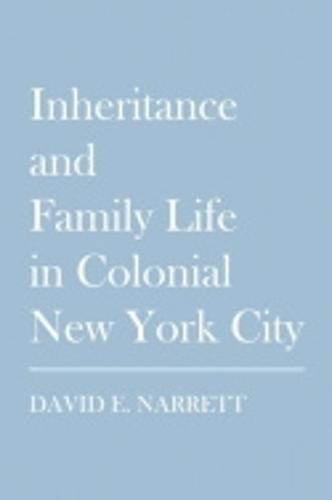Awards
- Winner of Winner of the 1992 Hendricks Manuscript Award give.
Overview
This book breaks new ground by offering the first detailed and systematic analysis of inheritance practices in New York City from the beginning of Dutch settlement in the 1620s to the onset of the American Revolution. By analyzing a broad range of original sources-including more than 2,300 wills-David E. Narrett shows how the transmission of property at death reflected the distribution of power and authority within the family. The author makes an especially important contribution to early New York history by explaining the Dutch origins of social and family customs, and by tracing the persistence of Dutch ways following the English conquest of New Netherland in 1664. He demonstrates that seventeenth-century Dutch law was particularly favorable to women since it sanctioned community property within marriage, the drafting of mutual wills by spouses, and the equal (or nearly equal) division of property among all children. While the book maintains its comparative focus on the Dutch and English traditions, it also includes material on other ethnic groups (for example, French Huguenots and Jews) living in a pluralistic society. Narrett utilizes both Dutch and English language sources to examine such pertinent topics as the relationship between law and social custom, primogeniture, kinship and communal ties, charitable bequests, the manumission of slaves, and the literacy level of testators. Written in a clear and precise manner, the book includes many tables that will give readers immediate access to supporting data, and a conclusion establishes the relationship of Narrett's findings to relevant scholarship. A valuable addition to the literature on inheritance, this is a book whose conclusions and data will be mined by colonialists, legal historians, and historians of women and the family.
Full Product Details
Author: David Narrett
Publisher: Cornell University Press
Imprint: Cornell University Press
Dimensions:
Width: 15.20cm
, Height: 1.90cm
, Length: 22.90cm
Weight: 0.454kg
ISBN: 9780801477195
ISBN 10: 0801477190
Pages: 277
Publication Date: 07 April 2011
Recommended Age: From 18 years
Audience:
General/trade
,
General
Format: Paperback
Publisher's Status: Active
Availability: In Print

This item will be ordered in for you from one of our suppliers. Upon receipt, we will promptly dispatch it out to you. For in store availability, please contact us.
Reviews
David E. Narrett's book is a beautifully written and comprehensive examination of inheritance practices in colonial New York City. -American Historical Review Inheritance and Family Life in Colonial New York City provides a wealth of insight into the gendered patterns of inheritance in one of the American colonies and is an important contribution to the history of the family in early America. -Journal of Social History As David E. Narrett argues in his book on colonial New York City wills, inheritance customs are good indicators of social values and cultural trends. This is true particularly when wills are studied by such careful investigators as Narrett. His book teaches us a great deal not only about the law of inheritance in early New York City but also about the values of the colonists who lived there. As a book in the history of the family, it is particularly useful for highlighting the differences between Dutch family relationships and those of the English in the seventeenth and early eighteenth centuries. -American Journal of Legal History Reprinted almost twenty years after its first appearance in 1992... This book is well written and organized and will offer an answer for almost any question on colonial inheritance law in New York -David J. Gary, New York History
Reprinted almost twenty years after its first appearance in 1992. . . This book is well written and organized and will offer an answer for almost any question on colonial inheritance law in New York David J. Gary, New York History
As David E. Narrett argues in his book on colonial New York City wills, inheritance customs are good indicators of social values and cultural trends. This is true particularly when wills are studied by such careful investigators as Narrett. His book teaches us a great deal not only about the law of inheritance in early New York City but also about the values of the colonists who lived there. As a book in the history of the family, it is particularly useful for highlighting the differences between Dutch family relationships and those of the English in the seventeenth and early eighteenth centuries. American Journal of Legal History
<p> As David E. Narrett argues in his book on colonial New York City wills, inheritance customs are good indicators of social values and cultural trends. This is true particularly when wills are studied by such careful investigators as Narrett. His book teaches us a great deal not only about the law of inheritance in early New York City but also about the values of the colonists who lived there. As a book in the history of the family, it is particularly useful for highlighting the differences between Dutch family relationships and those of the English in the seventeenth and early eighteenth centuries. -American Journal of Legal History
<p> As David E. Narrett argues in his book on colonial New York City wills, inheritance customs are good indicators of social values and cultural trends. This is true particularly when wills are studied by such careful investigators as Narrett. His book teaches us a great deal not only about the law of inheritance in early New York City but also about the values of the colonists who lived there. As a book in the history of the family, it is particularly useful for highlighting the differences between Dutch family relationships and those of the English in the seventeenth and early eighteenth centuries. American Journal of Legal History
Author Information
David E. Narrett is Associate Professor of History at the University of Texas Arlington.




